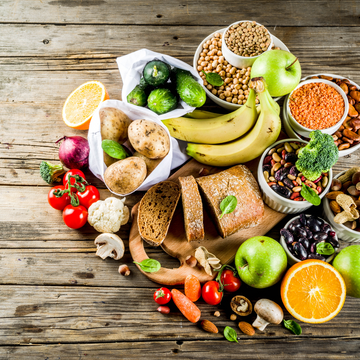Ultra-Processed Foods: What You Need to Know and Why You Should Avoid Them
by Namita S on Feb 09, 2024

In today's fast-paced world, convenience often takes precedence over health when it comes to food choices. Ultra-processed foods have become a ubiquitous part of the modern diet, offering quick and easy meals and snacks. However, despite their convenience, these highly processed products can have serious implications for our health.
What Are Ultra-Processed Foods?
Ultra-processed foods are typically made from cheap ingredients and additives. They undergo extensive processing and contain little to no whole foods. These products often contain a long list of ingredients, including artificial flavors, colors, preservatives, and sweeteners.
Examples of ultra-processed foods include:
Sugary cereals
Frozen pizzas
Packaged snacks (chips, cookies, and crackers)
Instant noodles
Sugary drinks (sodas, energy drinks, and flavored beverages)
Fast food items (burgers, fries, and chicken nuggets)
Processed meats (hot dogs, bacon, and deli meats)
Why Should You Avoid Ultra-Processed Foods?
Poor Nutritional Quality: Ultra-processed foods are typically low in essential nutrients and high in unhealthy ingredients such as refined sugars, unhealthy fats, and sodium. They lack the vitamins, minerals, fiber, and antioxidants found in whole, unprocessed foods.
Increased Risk of Chronic Diseases: Regular consumption of ultra-processed foods has been linked to an increased risk of obesity, type 2 diabetes, heart disease, high blood pressure, and certain cancers. These products often contribute to weight gain and metabolic disturbances due to their high-calorie content and poor nutritional quality.
Addictive Properties: Ultra-processed foods are designed to be highly palatable and addictive, stimulating pleasure centers in the brain and leading to overconsumption. This can contribute to unhealthy eating habits, cravings, and difficulty controlling portion sizes.
Negative Impact on Gut Health: Ultra-processed foods can disrupt the balance of bacteria in the gut, leading to gut dysbiosis, inflammation, and digestive issues. They often contain additives and emulsifiers that can harm the gut lining and promote inflammation.
Environmental Concerns: The production and consumption of ultra-processed foods contribute to environmental degradation, including deforestation, water pollution, and greenhouse gas emissions. The industrial processing of these products consumes large amounts of energy and resources, further exacerbating climate change.
How to Avoid Ultra-Processed Foods:
Focus on Whole, Unprocessed Foods: Choose whole foods in their natural state, such as fruits, vegetables, whole grains, legumes, nuts, seeds, lean proteins, and healthy fats. These foods are nutrient-dense and provide essential vitamins, minerals, fiber, and antioxidants.
Read Food Labels: When purchasing packaged foods, read the ingredient list and nutrition label carefully. Avoid products with a long list of ingredients, especially those containing added sugars, artificial flavors, colors, and preservatives.
Cook Meals at Home: Prepare homemade meals using fresh, wholesome ingredients. Cooking at home allows you to control the quality of ingredients and avoid the additives and unhealthy fats often found in ultra-processed foods.
Plan Ahead: Plan your meals and snacks ahead of time to avoid relying on convenience foods when hunger strikes. Stock your pantry with whole food staples and prepare healthy snacks to have on hand when cravings arise.
Limit Eating Out and Fast Food: Minimize consumption of restaurant meals, fast food, and takeout, as these options often contain high levels of sodium, unhealthy fats, and hidden additives. When dining out, choose restaurants that offer fresh, whole food options.
Be Mindful of Marketing Claims: Be cautious of food products marketed as "healthy" or "natural," as these terms can be misleading. Always check the ingredients and nutritional values of the product to determine its quality.
Conclusion:
Ultra-processed foods may offer convenience and affordability, but they come at a significant cost to our health and well-being. By understanding the risks associated with these products and making conscious choices to prioritize whole, unprocessed foods, we can protect our health and reduce the risk of chronic diseases. Let's take control of our diets and nourish our bodies with the wholesome, nutrient-rich foods they deserve.




